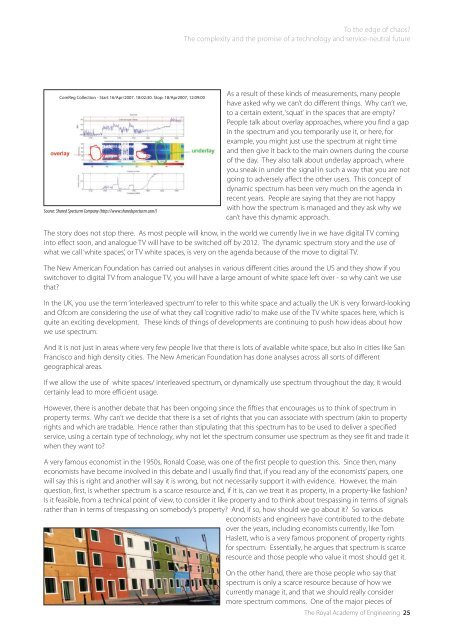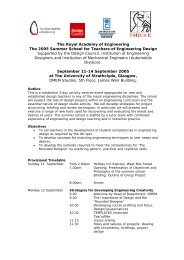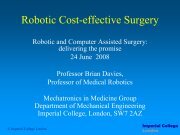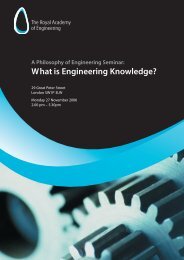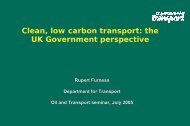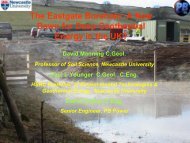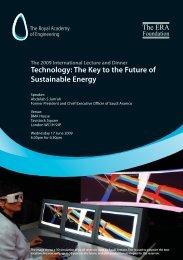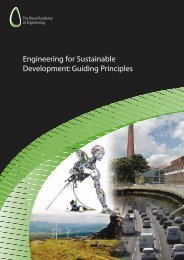Lecture Series in Mobile Telecommunications and Networks (1583KB)
Lecture Series in Mobile Telecommunications and Networks (1583KB)
Lecture Series in Mobile Telecommunications and Networks (1583KB)
You also want an ePaper? Increase the reach of your titles
YUMPU automatically turns print PDFs into web optimized ePapers that Google loves.
To the edge of chaos?<br />
The complexity <strong>and</strong> the promise of a technology <strong>and</strong> service-neutral future<br />
ComReg Collection - Start 16/Apr/2007. 18:02:30. Stop: 18/Apr2007, 12:09:00<br />
Source: Shared Specturm Company (http://www.sharedspecturm.com/)<br />
As a result of these k<strong>in</strong>ds of measurements, many people<br />
have asked why we can’t do different th<strong>in</strong>gs. Why can’t we,<br />
to a certa<strong>in</strong> extent, ‘squat’ <strong>in</strong> the spaces that are empty?<br />
People talk about overlay approaches, where you f<strong>in</strong>d a gap<br />
<strong>in</strong> the spectrum <strong>and</strong> you temporarily use it, or here, for<br />
example, you might just use the spectrum at night time<br />
<strong>and</strong> then give it back to the ma<strong>in</strong> owners dur<strong>in</strong>g the course<br />
of the day. They also talk about underlay approach, where<br />
you sneak <strong>in</strong> under the signal <strong>in</strong> such a way that you are not<br />
go<strong>in</strong>g to adversely affect the other users. This concept of<br />
dynamic spectrum has been very much on the agenda <strong>in</strong><br />
recent years. People are say<strong>in</strong>g that they are not happy<br />
with how the spectrum is managed <strong>and</strong> they ask why we<br />
can’t have this dynamic approach.<br />
The story does not stop there. As most people will know, <strong>in</strong> the world we currently live <strong>in</strong> we have digital TV com<strong>in</strong>g<br />
<strong>in</strong>to effect soon, <strong>and</strong> analogue TV will have to be switched off by 2012. The dynamic spectrum story <strong>and</strong> the use of<br />
what we call ‘white spaces’, or TV white spaces, is very on the agenda because of the move to digital TV.<br />
The New American Foundation has carried out analyses <strong>in</strong> various different cities around the US <strong>and</strong> they show if you<br />
switchover to digital TV from analogue TV, you will have a large amount of white space left over - so why can’t we use<br />
that?<br />
In the UK, you use the term ‘<strong>in</strong>terleaved spectrum’ to refer to this white space <strong>and</strong> actually the UK is very forward-look<strong>in</strong>g<br />
<strong>and</strong> Ofcom are consider<strong>in</strong>g the use of what they call ‘cognitive radio’ to make use of the TV white spaces here, which is<br />
quite an excit<strong>in</strong>g development. These k<strong>in</strong>ds of th<strong>in</strong>gs of developments are cont<strong>in</strong>u<strong>in</strong>g to push how ideas about how<br />
we use spectrum.<br />
And it is not just <strong>in</strong> areas where very few people live that there is lots of available white space, but also <strong>in</strong> cities like San<br />
Francisco <strong>and</strong> high density cities. The New American Foundation has done analyses across all sorts of different<br />
geographical areas.<br />
If we allow the use of white spaces/ <strong>in</strong>terleaved spectrum, or dynamically use spectrum throughout the day, it would<br />
certa<strong>in</strong>ly lead to more efficient usage.<br />
However, there is another debate that has been ongo<strong>in</strong>g s<strong>in</strong>ce the fifties that encourages us to th<strong>in</strong>k of spectrum <strong>in</strong><br />
property terms. Why can’t we decide that there is a set of rights that you can associate with spectrum (ak<strong>in</strong> to property<br />
rights <strong>and</strong> which are tradable. Hence rather than stipulat<strong>in</strong>g that this spectrum has to be used to deliver a specified<br />
service, us<strong>in</strong>g a certa<strong>in</strong> type of technology, why not let the spectrum consumer use spectrum as they see fit <strong>and</strong> trade it<br />
when they want to?<br />
A very famous economist <strong>in</strong> the 1950s, Ronald Coase, was one of the first people to question this. S<strong>in</strong>ce then, many<br />
economists have become <strong>in</strong>volved <strong>in</strong> this debate <strong>and</strong> I usually f<strong>in</strong>d that, if you read any of the economists’ papers, one<br />
will say this is right <strong>and</strong> another will say it is wrong, but not necessarily support it with evidence. However, the ma<strong>in</strong><br />
question, first, is whether spectrum is a scarce resource <strong>and</strong>, if it is, can we treat it as property, <strong>in</strong> a property-like fashion?<br />
Is it feasible, from a technical po<strong>in</strong>t of view, to consider it like property <strong>and</strong> to th<strong>in</strong>k about trespass<strong>in</strong>g <strong>in</strong> terms of signals<br />
rather than <strong>in</strong> terms of trespass<strong>in</strong>g on somebody’s property? And, if so, how should we go about it? So various<br />
economists <strong>and</strong> eng<strong>in</strong>eers have contributed to the debate<br />
over the years, <strong>in</strong>clud<strong>in</strong>g economists currently, like Tom<br />
Haslett, who is a very famous proponent of property rights<br />
for spectrum. Essentially, he argues that spectrum is scarce<br />
resource <strong>and</strong> those people who value it most should get it.<br />
On the other h<strong>and</strong>, there are those people who say that<br />
spectrum is only a scarce resource because of how we<br />
currently manage it, <strong>and</strong> that we should really consider<br />
more spectrum commons. One of the major pieces of<br />
The Royal Academy of Eng<strong>in</strong>eer<strong>in</strong>g 25


